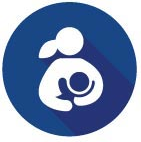
It is recommended that babies be exclusively breastfed for their first six months by the American Academy of Pediatrics. August is National Breastfeeding Month. After six months, it’s recommended that other foods be introduced alongside breast milk. The Centers for Disease Control list many benefits to both baby and mother. For infants it decreases the risk of asthma, obesity, respiratory infections, sudden infant death syndrome, and gastrointestinal infections. Benefits for mothers include lowering high blood pressure, lowering the risks of type 2 diabetes, ovarian cancer, and breast cancer.
Lactation counselor with Washington County Public Health Carol Detweiler encourages moms to find support, “You know, I always tell moms that each pregnancy can be different, each child can be different as far as their ability to latch and remove milk. And having support can be so helpful, if there’s family members that encourage you to continue and make sure you have other supports around you can be very helpful.” One option for support is a breastfeeding group on the second Friday of every month at 12:30 p.m. at the Kalona Public Library. Through the Maternal Health program, Detweiler offers one-on-one meetings with pregnant women and new moms once baby arrives, free of charge.
The CDC states that at this time only one in four infants is exclusively breastfed by the time they’re six months old, although statistics are showing upward trends. The percentage of babies who start out breastfeeding increased from 73% in 2004 to 84% in 2016. And the percentage of births in hospitals with recommended maternity care supporting breastfeeding increased from 1.8% in 2007 to 26.1% in 2018.

